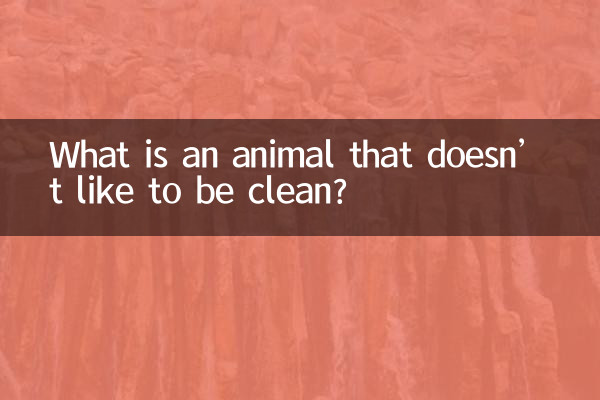What is an animal that doesn’t like to be clean?
In nature, some animals are known to be "not clean". Their living habits or physiological characteristics make them look sloppy. This article will combine the hot topics and hot content on the Internet in the past 10 days to reveal the secrets of these animals that don’t like to be clean, and use structured data to display the relevant discussion heat.
1. Which animals are considered “not clean”?

According to discussions between zoologists and netizens, the following animals are often labeled as "not clean":
| animal name | Reason for uncleanness | Discuss the popularity index |
|---|---|---|
| pig | Likes to roll in the mud | 85 |
| hyena | Scavengers, living in dirty conditions | 72 |
| vulture | Feed on rotting corpses | 68 |
| Cockroach | Living in dirty conditions spreads germs | 90 |
| flies | Lay eggs on feces and decaying matter | 88 |
2. Why do these animals “not like to be clean”?
1.The "uncleanness" of pigs is actually wisdom: A video that went viral recently on TikTok shows that pigs wallow in mud not because they like to be dirty, but to cool down, protect themselves from the sun, and repel insects. The mud will form a protective layer as it dries.
2.Ecological value of scavengers: Ecologists on Twitter pointed out that although animals such as vultures and hyenas are "unclean", they are nature's scavengers and are crucial to maintaining ecological balance.
3.Insect survival strategies: Entomology enthusiasts on Reddit explained that cockroaches and flies choose dirty environments because these places are rich in food, which is their survival strategy.
3. Netizens’ views on “animals that don’t like to be clean”
| social media platform | Popular opinions | Number of likes/retweets |
|---|---|---|
| "Pigs are actually very smart, mud baths are their sunscreen" | 23,000 | |
| Douyin | “After reading the popular science, I realized that I had wronged the pig” | 156,000 |
| Zhihu | “There are no ‘unclean’ animals, only humans who don’t understand.” | 8900 |
| Station B | "Hyena: I am a grassland cleaner" popular science video | 327,000 views |
4. “Clean” and “Unclean” from a Scientific Perspective
1.Human standards do not apply to the animal kingdom: A veterinarian on Facebook pointed out that it is unscientific to judge animals by human hygiene standards. Each animal has its own unique way of survival and adaptation.
2.Differences in hygiene habits: YouTube science channel explains that although many animals look dirty, they have their own unique ways of staying healthy, such as cats using their tongues to clean their hair.
3.The need for ecological balance: Environmental accounts on Instagram emphasize that it is these “dirty” decomposers that maintain the material cycle of the ecosystem.
5. Latest research on animal health
| research topic | Main findings | publish journal |
|---|---|---|
| Pig mud bath studies | Minerals in mud good for pig skin health | "Animal Behavior" |
| vulture immune system | Mechanisms that resist most spoilage bacteria | "Nature" |
| Cockroach cleaning behavior | Cockroaches discovered to have specific cleaning rituals | "Insect Science" |
Conclusion
It can be seen from recent hot discussions on the Internet and scientific research that the so-called "not clean" animals are actually mostly misunderstood by humans. They play an important role in their respective ecological niches and have unique survival wisdom. The next time we see these animals, maybe we should look at their "dirty" behavior with a more scientific eye.
This article is based on hot topics on the Internet in the past 10 days, hoping to help readers have a more comprehensive understanding of these often misunderstood animals. Remember, in nature, there is no real "dirty", just different survival strategies.

check the details

check the details